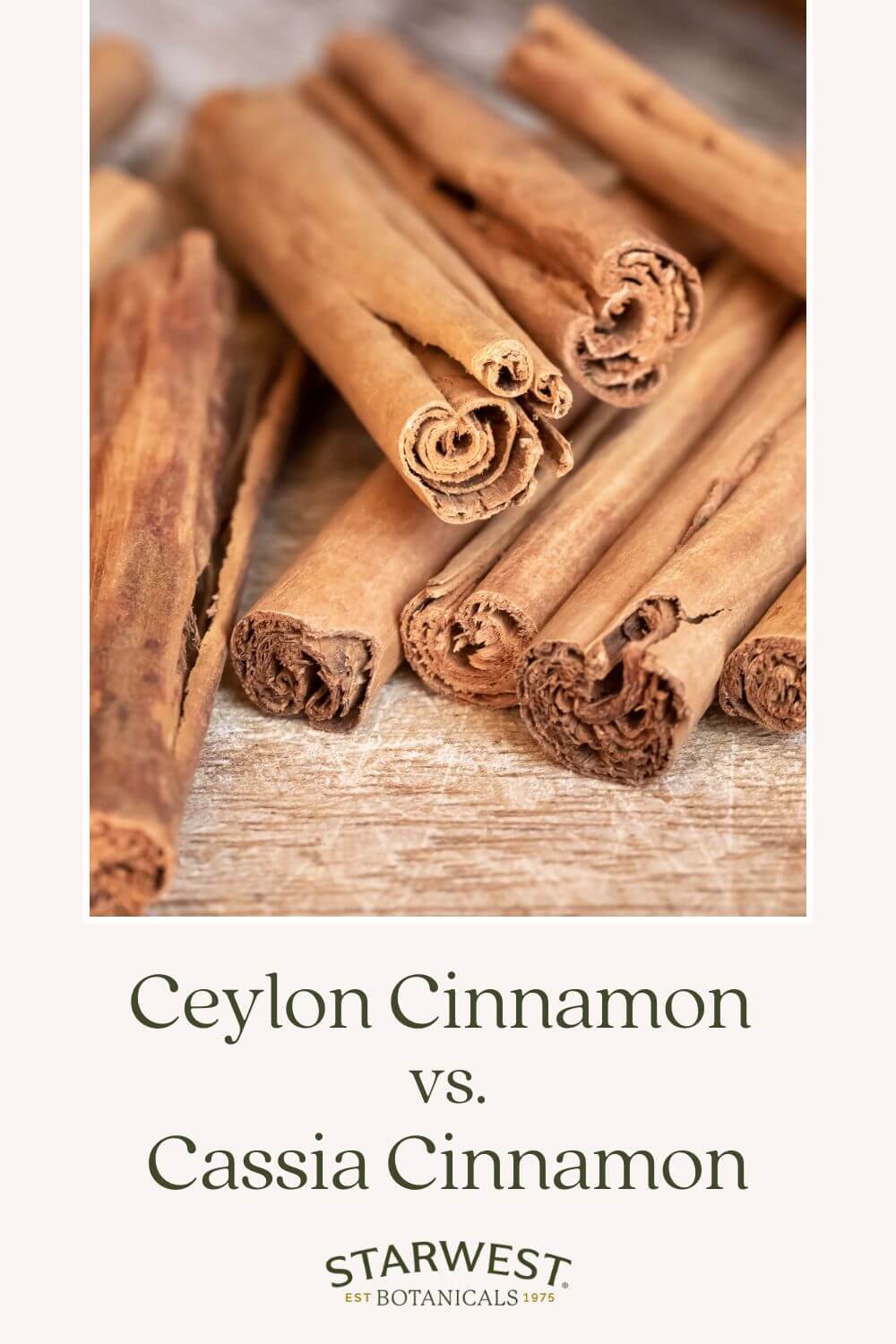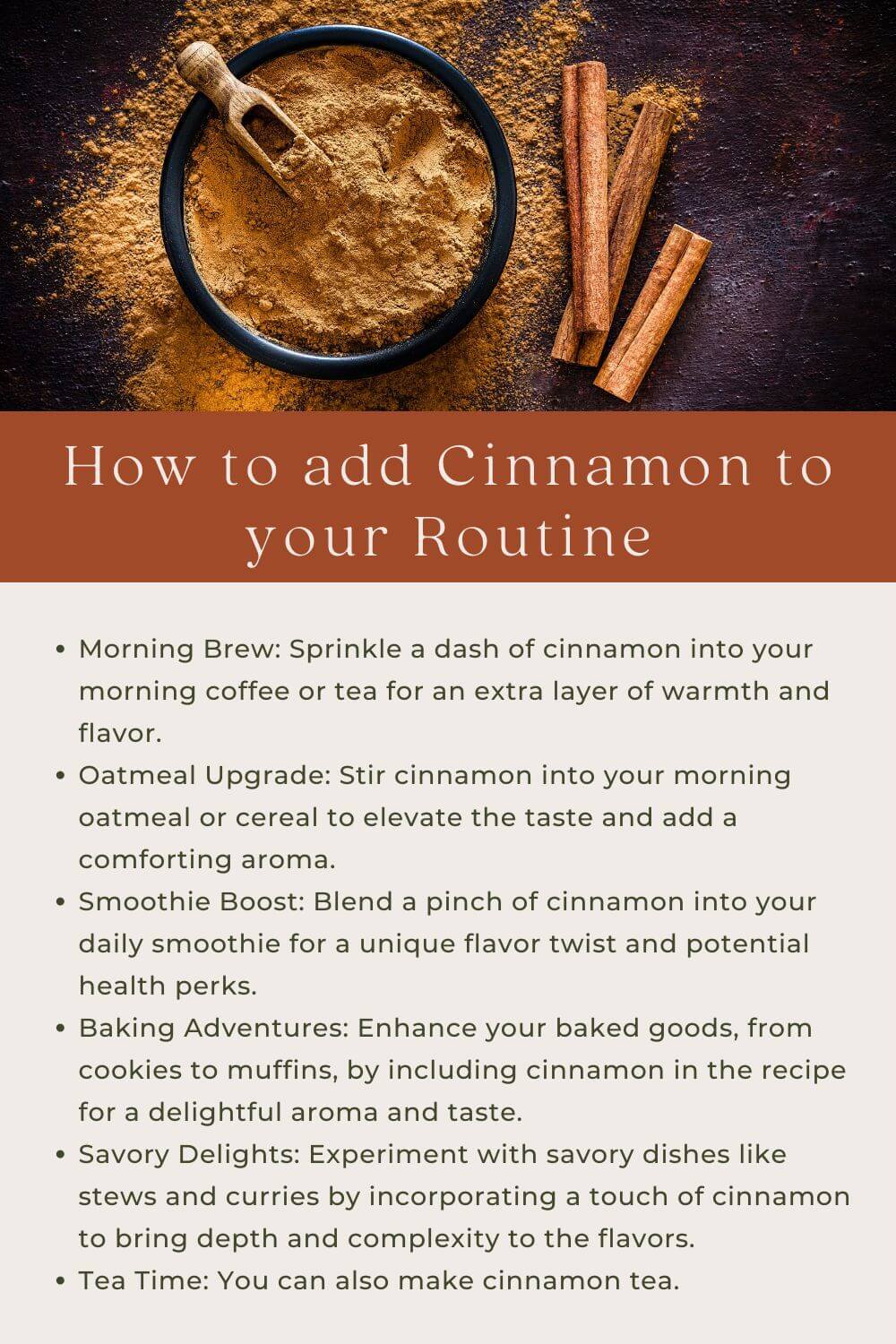Ceylon Cinnamon vs Cassia Cinnamon | Starwest Botanicals
Posted by Daniel Powers on 07-05-2024

Cinnamon is one of the most popular spices in the world. It’s used in everything from baked goods, to savory dishes, to pumpkin spice lattes. Cinnamon adds a warm and aromatic touch to a wide array of foods and dishes.
However, did you know that not all cinnamon is the same?
In fact, there are two primary types of cinnamon. Ceylon cinnamon, known as “true” cinnamon, and cassia cinnamon (i.e. common supermarket variety cinnamon).
Before you make a decision on which one to buy, there are a few key distinctions to keep in mind. We'll dig deep into the differences between Ceylon cinnamon and cassia cinnamon, as well as their similarities, in this article.
If you’re looking to stock up on cinnamon, look no further. We have a collection of cinnamon powders, sticks, and more here at Starwest Botanicals!
Differences Between Ceylon Cinnamon and Cassia Cinnamon:
There are a handful of key differences between ceylon cinnamon and cassia cinnamon. Below is an in-depth review of the primary differences.
1. Origin and Botanical Source:
Ceylon Cinnamon: Ceylon cinnamon, scientifically known as Cinnamomum verum or "true cinnamon," originates primarily from Sri Lanka (i.e. “Ceylon”). It is derived from the inner bark of the Cinnamomum verum tree.
Cassia Cinnamon: Cassia cinnamon, on the other hand, encompasses several varieties, including Indonesian, Saigon, and Chinese cinnamon. Cassia is primarily sourced from Cinnamomum cassia or Cinnamomum aromaticum trees, which are native to China and other parts of Southeast Asia.
2. Appearance:
Ceylon Cinnamon: Ceylon cinnamon sticks are characterized by a delicate, pale brown color and thin, multiple layers gracefully swirled inside. Its appearance is elegant and subtle, setting it apart from the more robust-looking Cassia variety.
Cassia Cinnamon: Cassia cinnamon sticks are darker brown and are typically rolled in thicker, single sheets. This variety is what many people commonly envision when thinking of a cinnamon stick.
3. Flavor Profile:
Ceylon Cinnamon: Known for its mild and delicate flavor, Ceylon cinnamon offers subtle, slightly sweet notes. This makes it particularly useful for recipes where a gentle cinnamon flavor is desired without overpowering other flavors.
Cassia Cinnamon: Cassia boasts a bolder and more robust flavor compared to Ceylon. The various types of Cassia, such as Indonesian, Saigon, and Chinese, each contribute their own distinctive profiles, ranging from spicy to sweet.
4. Culinary Applications:
Ceylon Cinnamon: Due to its refined taste, Ceylon cinnamon is often preferred in delicate recipes where its subtle notes can shine. It complements desserts, beverages, and dishes where a mild cinnamon presence is desired.
Cassia Cinnamon: Cassia, with its more intense flavor, finds its place in heartier recipes. It is well-suited for both sweet and savory dishes, adding a bold and aromatic element to a wide range of culinary creations.
5. Safety:
Ceylon Cinnamon: Cinnamon contains coumarin content, a phytochemical that can impact liver health if over-consumed. Ceylon cinnamon contains little to no coumarin content.
Cassia Cinnamon: This cinnamon varietal contains higher levels of coumarin. Consuming too much cassia cinnamon can have potential health effects, though moderate usage shouldn't cause any concern.
6. Pricing:
Ceylon Cinnamon: This form of cinnamon is more expensive to buy. It can also be difficult to buy as it’s not as widely available. It can be found in specialty spice shops (or online here at Starwest Botanicals).
Cassia Cinnamon: This is the standard type of cinnamon that you’ll find at your local supermarket. It’s typically fairly inexpensive.
Which is Better: Ceylon Cinnamon or Cassia?
Since cassia cinnamon contains higher coumarin levels, it's generally thought that Ceylon cinnamon is better. Additionally, from a flavor perspective, Ceylon has a more subtle, less bitter taste.
However, as long as you consume moderate amounts of cinnamon, both forms of cinnamon are safe to consume - and delicious!

How To Add Cinnamon To Your Routine:
Adding cinnamon to your daily routine is not only a flavorful choice but also one that may offer potential health benefits. Here are a few creative ways to incorporate this versatile spice into your life:
- Morning Brew: Sprinkle a dash of cinnamon into your morning coffee or tea for an extra layer of warmth and flavor.
- Oatmeal Upgrade: Stir cinnamon into your morning oatmeal or cereal to elevate the taste and add a comforting aroma.
- Smoothie Boost: Blend a pinch of cinnamon into your daily smoothie for a unique flavor twist and potential health perks.
- Baking Adventures: Enhance your baked goods, from cookies to muffins, by including cinnamon in the recipe for a delightful aroma and taste.
- Savory Delights: Experiment with savory dishes like stews and curries by incorporating a touch of cinnamon to bring depth and complexity to the flavors.
- Tea Time: You can also make cinnamon tea. Check out our delicious cinnamon tea recipe here.
Conclusion:
In the diverse realm of spices, cinnamon stands out as a cherished ingredient, enhancing everything from desserts to savory delights.
Before making your cinnamon selection, consider the key differences. Ceylon, the "true" cinnamon, offers a delicate flavor, sourced from Sri Lanka. Cassia, encompassing Indonesian, Saigon, and Chinese varieties, brings a bolder taste commonly found in local supermarkets.
From a culinary standpoint, Ceylon shines in delicate recipes, while Cassia's robust notes elevate heartier dishes. For those mindful of health, Ceylon's minimal coumarin content makes it a safer choice.
Price-wise, Ceylon may be a premium option, while readily available Cassia provides a budget-friendly alternative.
In the Ceylon vs. Cassia debate, the choice depends on your palate and preferences.
Here at Starwest, we offer a variety of cinnamon products. Whether you’re looking for cinnamon sticks, cinnamon powder, or a cinnamon extract, we have you covered with certified organic bulk cinnamon.
Author Bio
Daniel has a master's degree in herbal science from the Maryland University of Integrative Health. He's the founder of The Botanical Institute, where he writes about the health benefits of herbs.

